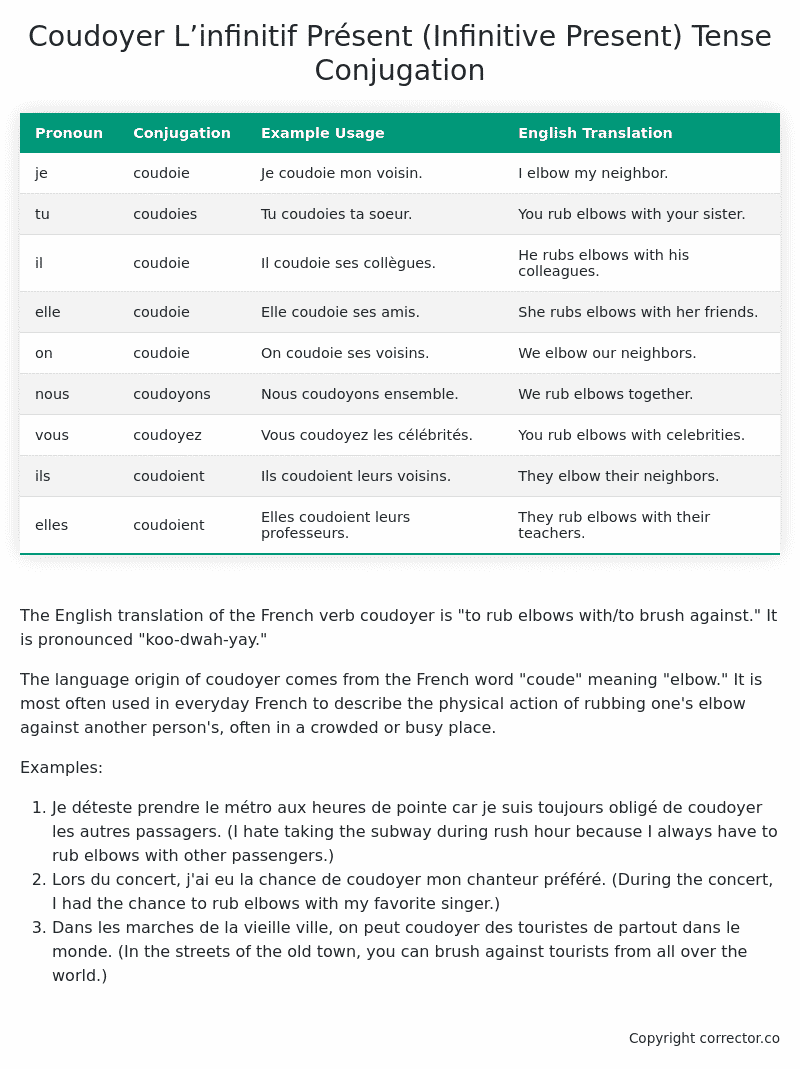L’infinitif Présent (Infinitive Present) Tense Conjugation of the French Verb coudoyer
Introduction to the verb coudoyer
The English translation of the French verb coudoyer is “to rub elbows with/to brush against.” It is pronounced “koo-dwah-yay.”
The language origin of coudoyer comes from the French word “coude” meaning “elbow.” It is most often used in everyday French to describe the physical action of rubbing one’s elbow against another person’s, often in a crowded or busy place.
Examples:
- Je déteste prendre le métro aux heures de pointe car je suis toujours obligé de coudoyer les autres passagers. (I hate taking the subway during rush hour because I always have to rub elbows with other passengers.)
- Lors du concert, j’ai eu la chance de coudoyer mon chanteur préféré. (During the concert, I had the chance to rub elbows with my favorite singer.)
- Dans les marches de la vieille ville, on peut coudoyer des touristes de partout dans le monde. (In the streets of the old town, you can brush against tourists from all over the world.)
Table of the L’infinitif Présent (Infinitive Present) Tense Conjugation of coudoyer
| Pronoun | Conjugation | Example Usage | English Translation |
|---|---|---|---|
| je | coudoie | Je coudoie mon voisin. | I elbow my neighbor. |
| tu | coudoies | Tu coudoies ta soeur. | You rub elbows with your sister. |
| il | coudoie | Il coudoie ses collègues. | He rubs elbows with his colleagues. |
| elle | coudoie | Elle coudoie ses amis. | She rubs elbows with her friends. |
| on | coudoie | On coudoie ses voisins. | We elbow our neighbors. |
| nous | coudoyons | Nous coudoyons ensemble. | We rub elbows together. |
| vous | coudoyez | Vous coudoyez les célébrités. | You rub elbows with celebrities. |
| ils | coudoient | Ils coudoient leurs voisins. | They elbow their neighbors. |
| elles | coudoient | Elles coudoient leurs professeurs. | They rub elbows with their teachers. |
Other Conjugations for Coudoyer.
Le Present (Present Tense) Conjugation of the French Verb coudoyer
Imparfait (Imperfect) Tense Conjugation of the French Verb coudoyer
Passé Simple (Simple Past) Tense Conjugation of the French Verb coudoyer
Passé Composé (Present Perfect) Tense Conjugation of the French Verb coudoyer
Futur Simple (Simple Future) Tense Conjugation of the French Verb coudoyer
Futur Proche (Near Future) Tense Conjugation of the French Verb coudoyer
Plus-que-parfait (Pluperfect) Tense Conjugation of the French Verb coudoyer
Passé Antérieur (Past Anterior) Tense Conjugation of the French Verb coudoyer
Futur Antérieur (Future Anterior) Tense Conjugation of the French Verb coudoyer
Subjonctif Présent (Subjunctive Present) Tense Conjugation of the French Verb coudoyer
Subjonctif Passé (Subjunctive Past) Tense Conjugation of the French Verb coudoyer
Subjonctif Imparfait (Subjunctive Imperfect) Tense Conjugation of the French Verb coudoyer
Subjonctif Plus-que-parfait (Subjunctive Pluperfect) Tense Conjugation of the French Verb coudoyer
Conditionnel Présent (Conditional Present) Tense Conjugation of the French Verb coudoyer
Conditionnel Passé (Conditional Past) Tense Conjugation of the French Verb coudoyer
L’impératif Présent (Imperative Present) Tense Conjugation of the French Verb coudoyer
L’infinitif Présent (Infinitive Present) Tense Conjugation of the French Verb coudoyer (this article)
Struggling with French verbs or the language in general? Why not use our free French Grammar Checker – no registration required!
Get a FREE Download Study Sheet of this Conjugation 🔥
Simply right click the image below, click “save image” and get your free reference for the coudoyer L’infinitif Présent tense conjugation!

Coudoyer – About the French L’infinitif Présent (Infinitive Present) Tense
Forming the Infinitive Present
Common Everyday Usage Patterns
As a Verb’s Dictionary Form
After Modal Verbs
As an Imperative
In Infinitive Clauses
Interactions with Other Tenses
Present Tense
Future Tense
Conditional Tense
Passé Composé
Imperfect Tense
Subjunctive and Conditional Moods
Summary
Want More?
I hope you enjoyed this article on the verb coudoyer. Still in a learning mood? Check out another TOTALLY random French verb conjugation!


